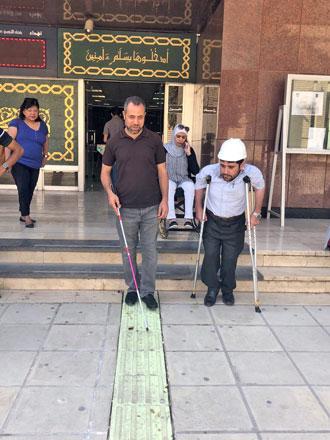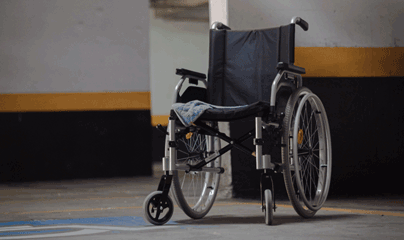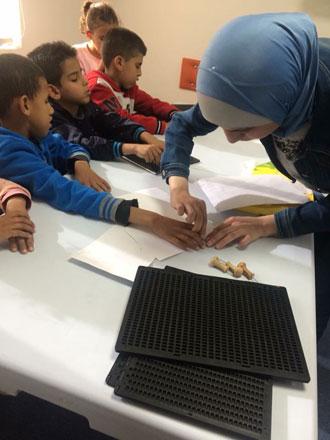You are here
Education for students with disabilities: an inherently hard journey made harder
By Maram Kayed - Feb 14,2019 - Last updated at Feb 14,2019

A visually-impaired man walks along the USAID-funded safe walking lane at the University of Jordan in this undated photo (Photo courtesy of Hadeel Abu Soufeh)
AMMAN — “People are always telling me ‘oh, you are so very brave’ or ‘keep fighting!’ but the truth is that there is nothing heroic about having to go through physical and mental torment,” said Tasneem Jarrar, a physically challenged student.
The first law for people with disabilities was enacted in 1964, stipulating that “public agencies must provide equal educational opportunities”, yet some five decades later, physically challenged students say they are still struggling throughout their academic journey.
“Students in universities, qualified in the law as ‘public institutions’, have but two choices: to either battle their way to graduation, or retract from the fight altogether,” Jarrar, a student of German and English at the University of Jordan (UJ), said in a recent interview with The Jordan Times.
“I am not requesting an easy ride, because no one in college can hope for that. I just do not want more degradation and frustration at my university,” Jarrar said.
“If one wants to evaluate just how dire the situation is, then one must look at the best university in the Kingdom and then assume that things are much worse everywhere else,” said Eman Majdalweyeh, Jarrar’s mother.
Struggles of the short-sighted
Over the past 10 years, more than 500 students with visual impairments were accepted into Jordanian universities, according to figures provided by the Higher Council for the Rights of Persons with Disabilities (HCD).
Although no specific figures were available as to those accepted into UJ, the number was enough for the USAID to fund a JD102,000-project for safe walking lanes.
“Unfortunately, although there is a considerable amount of visually-impaired students in Jordanian universities, and a sizeable proportion of those attend UJ in particular, they are only allowed to study Sharia (Islamic Studies), Arts, Languages, Business and Special Education. That means that many of them are denied the chance to follow their dreams,” Secretary General of the HCD Muhanned Azzeh said.
Azzeh told The Jordan Times that visually impaired students in the Kingdom are excluded from maths classes once they reach secondary school, and thus are unable to register in the Tawjihi scientific stream or enrol in a scientific major in university.
He noted that the Ministry of Education states “financial shortages” and a “lack of trained personnel” as their excuse for what he described as an “outdated regulation”.
“It is disappointing to see short-sighted doctors and engineers in developed countries who are not deprived of their ambition just because of a disability, while our talented sons and daughters are,” said Azzeh.
Although the People With Disabilities Law (20) passed in 2017 stipulates that the visually impaired must be included in maths classes without distinction, execution is lacking.
“Implementation remains in the pre-planning stage, and has a long way to go,” said Azzeh.
The Ministry of Education was not available for comment, despite repeated attempts by The Jordan Times.
Those who do study one of the five permitted majors face their own set of problems.
Suzan Khalaileh, an Applied English student at UJ, said the Deanship of Student Affairs sets a 500 Braille-page limit, which usually only covers around 100 pages of a book after it’s translated.
However, Khalaileh, who usually registers for five courses a semester, needs around 1,500 pages from five or more books to be printed in Braille.
“Because Braille requires a much bigger font, this is how I end up every semester: I cannot afford to print or transfer the rest of the pages into Braille on my own, as they are very expensive, so I turn to recording lectures,” she said.
When students like Khalaileh get to their midterm or final exams, another problem arises, which is the search for someone willing to write for them.
In many cases, visually impaired students turn to student-run initiatives, like the one Khalaileh usually goes to for help on her exams.
Both the initiative and the concerned university-run department at the deanship rely on volunteers.
The problem is that volunteers are not reliable, according to Eithar who is PhD student at UJ, and asked to have her last name omitted.
Because it is a voluntary programme, people who enrol face no ramifications for abruptly leaving the initiative, or just failing to do their tasks correctly.
“I cannot count the number of times I have been stood up at the last minute before an exam. Volunteers usually stop answering their phones or simply say ‘oops, I forgot’. Then you are left stressed, vexed, worried and on your own, just seconds before an exam you are already scared of,” Eithar explained.
“Even worse is when people take advantage of your urgent need and manipulate you for money. Although I am not happy about being taken advantage of in that cruel way, I pay. The stakes are higher when you are a PhD student and that is just the way it is,” she added.
Struggles of the physically challenged
“I once had an instructor refuse to change classrooms, from the second to first floor, though I was in a wheelchair, because the classroom on the second floor was closer to his office,” said Hussein, a finance student who asked that his last name not be used.
Hussein has faced lecturers who are unwilling to change their lecture rooms for him, administration employees who do not diligently follow his case and students who ask for money to unload his wheelchair from his car.
“There was one semester when this well-connected professor dismissed my and the deanship’s pleas to change our lecture room, and I was so indignant... at the lack of laws to protect my rights, I dropped the whole semester and [eventually] decided to drop out,” Hussein recalled.
Otherwise adamant in his determination not to go back, Hussein finally agreed to resume his education after continuous encouragement from his parents.
They ended up paying one of his friends JD300 a month to unload Hussein’s wheelchair and follow up on the necessary procedures for transferring his lectures.
Hussein graduated in 2017 with honours.
Wheelchair-accessible buildings and parking spaces would partly save students some trouble but only so few exist, Majdalaweyeh suggested.
“What bothers me the most is that even though the language centre at the university is one of the newest, it is neither wheelchair-accessible nor has an elevator. I understand why this detail was overlooked in the old buildings, but how can one not think of it with something built only a few years ago?” said Majdalaweyeh, whose daughter, Jarrar, cannot visit her professors during office hours for help because of the centre’s inaccessibility.
Meanwhile, some students have their minds set on proving that their disabilities will push them further towards achieving their goals.
In one of his lectures, Associate Professor at the Sharia Faculty Jihad Nuseirat mentioned a young physically challenged man who completed his architecture degree in four years instead of the regular five, a feat many students without disabilities cannot achieve.
The next stage for any student after graduation would be employment, which might prove a little trickier for those with a disability.
“The law requires that persons with disabilities should constitute at least 4 per cent of any public or private institutes’ workforce, but that law has a loophole,” Azzeh claimed.
He concluded: “It is extremely difficult to prove if an institute truly discriminates against persons with disabilities, which we have to admit many of them do, or if they do not have any vacancies for anyone. That is why the law could easily be dodged with a simple ‘we are not hiring anyone at the moment’.”
Related Articles
Salma waits at the exit of the kindergarten in Abdoun, where she works as a director for children with disabilities, for an interview with The Jordan Times.
AMMAN — Nine PhD holders staged a sit-in protest in front of the Higher Council for the Rights of Persons with Disabilities on Thursday dema
AMMAN — A blind woman is helping other people with visual impairment integrate socially and academically by teaching them Braille (a reading


















